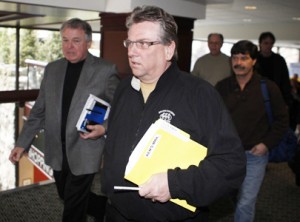
Will a dispute with Canadian workers bring down Chrysler? Lewenza doesn't appear ready to blink.
There’s a huge game of chicken underway between Chrysler management and the Canadian Auto Workers Union – and it could well decide the fate of the struggling automaker.
Chrysler Chairman Robert Nardelli said new contracts with both the UAW and the Canadian union are now critical to the company’s survival.
“Now, what we’re asking for is difficult. It will require hard choices by companies. It will require unions and workers who have already made extraordinarily painful concessions to do more … It will require efforts from a whole host of other stakeholders, including dealers and suppliers,” Nardelli said in a message to employees late Thursday.
“Chrysler and the Canadian Auto Workers union have held a series of meetings, but unfortunately, have not reached an agreement on concessions as outlined by the Canadian government. The CAW has been unwilling to abide by the terms of the Canadian government loan, which requests that the union meet local transplant all-in labor costs. This issue is also critical. Without a successful resolution, the alliance with Fiat and our continued viability is at risk,” Nardelli added.
However, CAW President Ken Lewenza said he wasn’t about to accept Chrysler’s calculations about labor costs in Canada, where the automaker has about 9,000 employees and two key assembly plants. “We do not accept Chrysler’s claim that the work of CAW members costs $76 (Canadian) per hour. This is an inflated and artificial figure that includes many non-relevant factors, such as expenses associated with retirees who have not worked at Chrysler for years, and payroll taxes which are paid to government, not to workers. Perhaps most galling of all, Chrysler’s number even includes the proportional cost of downtime and lay-offs. In essence, we are being “charged” for our own unemployment. The best way to reduce that artificial $76 number is to put Chrysler workers back to work: that alone would reduce hourly costs by several dollars per hour,” said Lewenza.
“And we do not remotely accept the claim that there is a cost gap of up to $19 (Canadian) per hour between our facilities and non-union auto assembly plants in Canada. The Canadian executives of Toyota and Honda have described many times their strategy of essentially matching wages, pensions, and core benefits to those paid in CAW-represented facilities (as a key part of their long-term effort to avoid unionization),” Lewenza said.
With only two weeks left before the current government guarantees run out, the angry exchange between Lewenza and Nardelli sets up some hard-edged bargaining, when the two sides are set to sit down, next week. The angry talk in Canada is very likely to slow down negotiations in the U.S. where Chrysler also is seeking additional concessions, as well as relief from its debt to the UAW’s Voluntary Employee Benefit Association that was set up two years ago to pay for retiree health care.
Chrysler reportedly has been dangling a 20% ownership stake in front of the UAW in exchange for 50 percent of the VEBA obligation. The UAW, however, seems unwilling to cut a deal until it sees what kind of agreement Chrysler reaches with the Canadian union.
